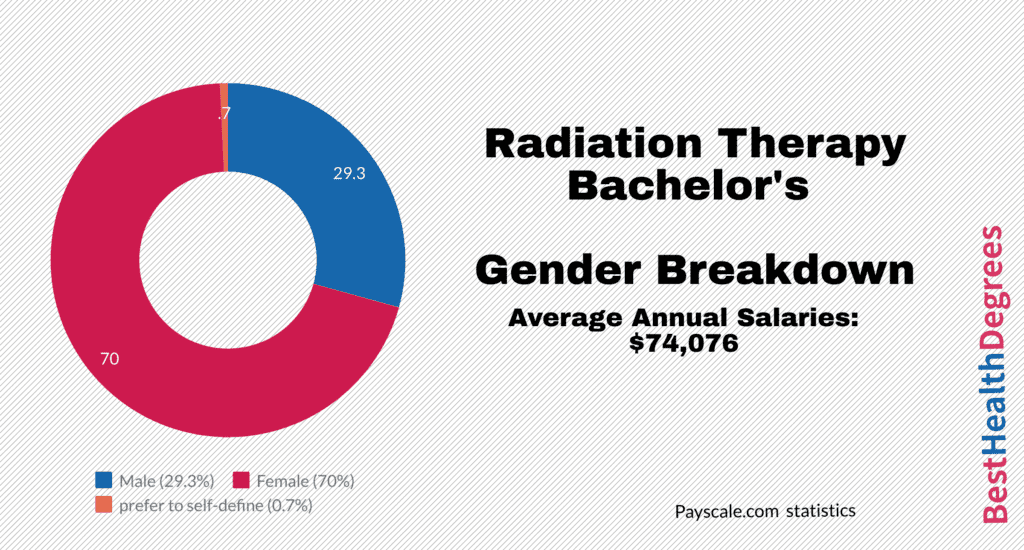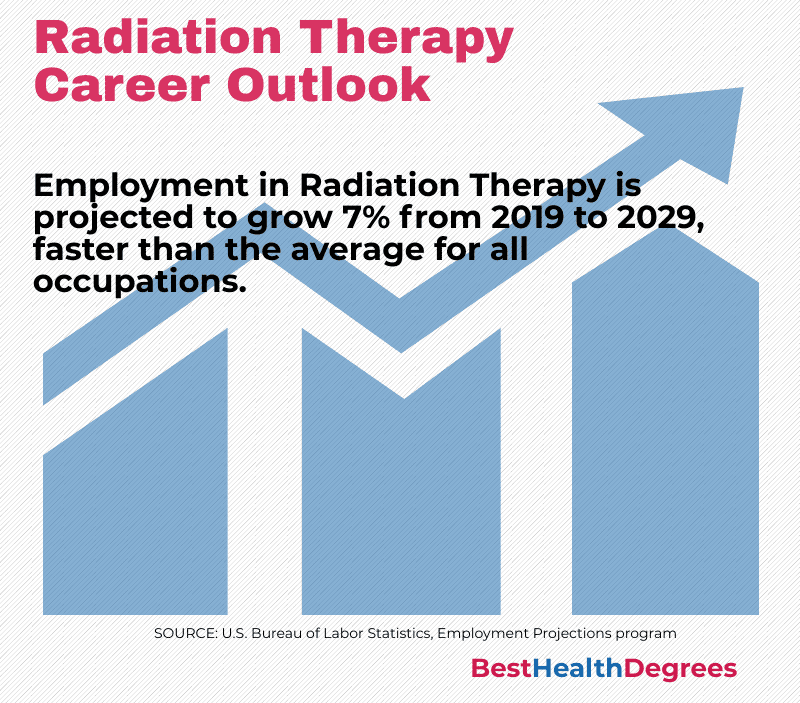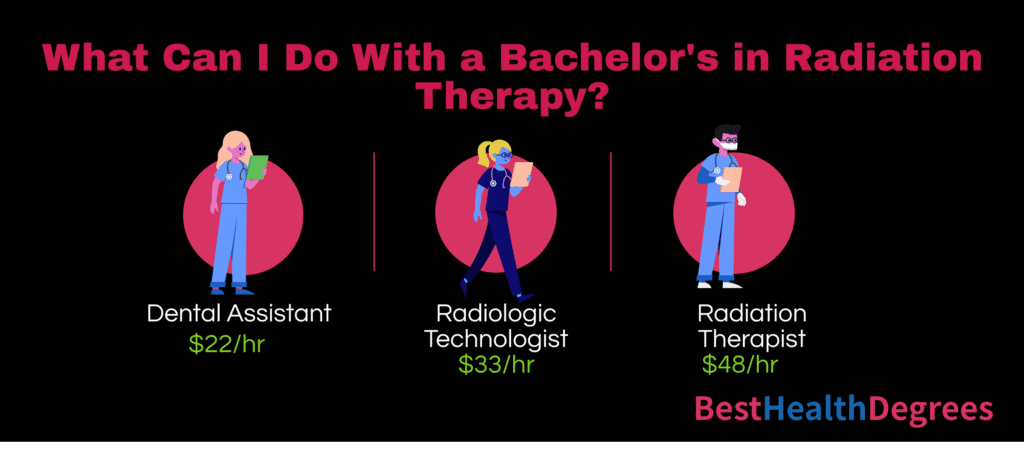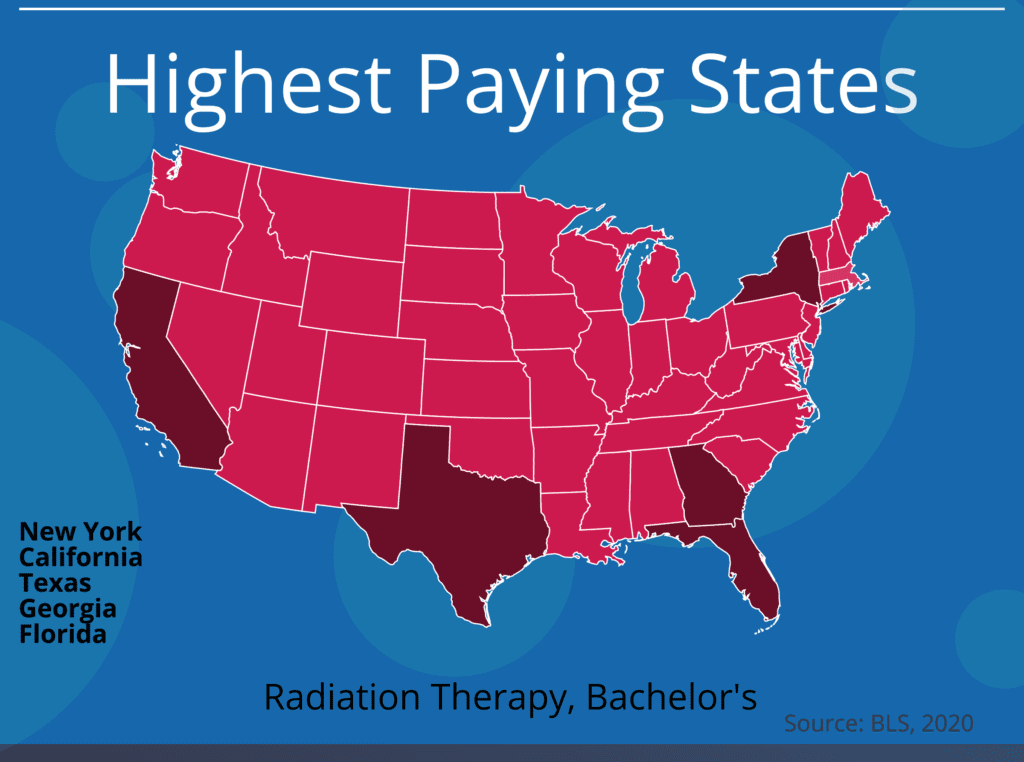Key Takeaways:
- Medical Radiation Science helps diagnose and treat conditions like cancer using imaging like CT scans and X-rays.
- Radiation therapy, using ionizing radiation, can kill cancer cells but has risks, including potential DNA mutations.
- A degree in Radiation Therapy teaches patient diagnosis, treatment preparation, and machine operation in healthcare settings.
- Accredited programs in Radiation Sciences ensure quality education, meeting high standards for a career in radiation therapy.
One of the most amazing medical breakthroughs in the 20th century was harnessing radiation for diagnosing, treating, and curing disease. Gamma rays, x-rays, and other scanning procedures that require ionizing radiation provide a double-edged sword to health care workers. While these machines produce more accurate diagnoses and can sometimes be used to treat cancer, they can also put adults and children undergoing radiology scans at risk. That’s why good training and education – such as a radiation sciences degree – is crucial to becoming a radiation science professional.
In this section, we will discuss the following:
- What is medical radiation science?
- Why get a degree in radiation therapy?
What is Medical Radiation Science?
Medical Radiation Scientists (MRS) work in healthcare and perform diagnostic imaging on patients. They may also conduct studies related to imaging technology and administer radiation treatments to patients who have cancer.

According to the American Cancer Society, these imaging tests include CT scans, x-rays, and nuclear medical tests such as bone scans and PET scans. During these tests, radiologists must protect themselves from low-level radiation required to create pictures of the inside of the human body. However, tests such as MRIs and ultrasounds don’t use ionizing radiation.
In adults, the exposure to radiation from 2 chest X-rays equals 0.1 mSv, while a chest CT emits up to 8 mSv of radiation. On the other hand, a PET/CT scan emits as much as 30 mSv. Technicians to stay in this field for a long time must take extreme care to protect themselves during every scan. Fluoroscopy, which takes numerous images produces varying amounts of radiation. This depends on how many imaging tests the patient undergoes. Technology in the field is always improving, making tools that are safer for both technicians and patients.
Radiation exposure in children varies for different tasks. It’s important to change the settings on the machine used to account for children’s smaller body size. This helps to prevent a higher concentration of radiation exposure. Newborns are especially vulnerable due to their small size. Adjustments are required to reduce the impact on smaller patients.
There are additional precautions needed when it comes to children and exposure to radiation due to the following concerns:
- Children have increased sensitivity when it comes to radiation exposure.
- Since children live longer following the procedure, they may develop issues over time if exposed to high amounts of radiation.
- Some procedures introduce a higher amount of radiation than needed. This includes CT scans where the scanner has not been adjusted for a child’s body size.
So, what does all this mean for children? These factors indicate that children are at risk for developing cancer-related to radiation exposure. More studies are needed to understand the impact of radiation technology over the course of a lifetime. Children should only get radiation scans and imaging when absolutely necessary.
What is radiation therapy? When someone receives radiation therapy, ionizing radiation helps kill cancer cells. However, the treatment itself may lead to mutations in DNA that can lead to other types of cancer. Doctors also use radiation therapy to treat medical conditions that respond to this technology. Radiation therapy can be considered a last-resort treatment option due to the associated risks. There’s no doubt that this therapy saves lives, but the potential for extreme side effects may outweigh the risk in certain conditions.
Why Get a Degree in Radiation Therapy?
With a degree in radiation therapy, students can learn how to diagnose patients in a health care or clinical environment. Most commonly, radiation therapists work with cancer patients and learn to prepare patients for treatment and to provide the treatment itself. Attending physicians oversee the work of radiation therapists and teach them how to administer different types of therapy. Graduates working in this field also learn how to prepare different types of equipment used in radiation therapy.
In summary, radiation therapists:
- Prepare equipment and patients for radiation therapy. They may also administer the therapy and assist in setting dosages for treatment.
- Take courses on treatment planning, radiation oncology, dosimetry, and the impact of radiation on the body.
Accreditation For Radiation Sciences Programs
When looking for an online or traditional school for radiology, choose accredited radiation therapy schools. The Joint Review Committee on Education in Radiologic Technology or JRCERT certifies programs that deal with radiation science.
Standards for an Accredited Consider the programs Educational Program in Radiography, Radiation Therapy, Magnetic Resonance, and Medical Dosimetry are designed to promote academic excellence, patient safety, and quality healthcare.
Radiation therapy-accredited schools go through a certification process and are required to meet or exceed JRCERT standards. Accreditation must be renewed every 18 months to three years depending on the program. Accredited radiation therapy programs may include radiation therapy and radiation science courses. Students should choose only accredited schools to make sure that hiring managers and other universities recognize their degrees. Note that an applicant program is seeking accreditation but has not yet received accredited status. Learn more about JRCERT accreditation here.
The American Council on Higher Education and Accreditation maintains a database of all colleges and universities accredited in the United States. Students can use this resource to validate whether an online school has the right credentials to support a range of career opportunities.
Like other academic programs, accredited radiation therapy programs may have regional or national accreditation. At the regional level, there are six different agencies that oversee particular geographies. Accredited radiation therapy schools Must also achieve national accreditation. At the national level, there are agencies that accredit schools from a broader perspective. Learn more about college accreditation here.
Radiation therapy accredited schools provide the assurance that various programs in the universities have academic rigor and properly prepare radiation scientists for the job market.
Types of Radiation Science and Therapy Degrees
Radiation therapy degrees online or on campus include a bachelor’s degree in radiologic technology. This is also called radiologic science or radiology. Online radiation therapy degrees Are convenient for students who are comfortable in the online learning environment.
A radiation therapy online degree teaches students how to use advanced technology to create images of the body. These images are used to treat and diagnose a variety of conditions. Getting a radiation therapy degree online also teaches students how to provide competent care to medical patients.

Majors involving an online radiation therapy degree, also called specialties, include the following:
- Radiography
- Radiation Therapy
- Nuclear medicine technology (NMT)
- Sonography/Ultrasound
- Magnetic resonance imaging (MRI)
A radiation therapy online degree can also lead to related careers. With a radiation therapy degree online, students can become dental hygienists, nursing assistants, and orderlies. An online radiation therapy degree sometimes leads to a career in nursing or respiratory therapy. As a flexible option for students, a radiation science degree combines science and care, which may appeal to those who love math and science but also want a career that involves helping people.
With a bachelor’s degree in radiation therapy from a top school, graduates can seek employment from top hospitals and employers.
With radiation therapy degrees online from a reputable school, graduates can pursue jobs in hospitals, clinics and other healthcare settings. These degrees often appeal to students who love math and science and there is a heavy those of science courses required. There is also a practical element to this field. Perspective students should consider their ability to learn how to operate many different machines.
With online radiation therapy degrees, graduates most likely will deal directly with patients. Many patients who go through radiation therapy or come in for imaging are in the early or late stages of critical or terminal medical conditions. This may be a factor for those who don’t want to deal with this on a daily basis.
Certifications and Licenses in Radiation Sciences
An online radiation therapy certificate program can prepare students for radiology and related careers. With a radiation therapy certificate program online, graduates can work under the care and supervision of positions in clinical settings. A radiation therapy certificate online can be attained at the postgraduate level or as a standalone program. However, a radiation therapy certification online may not be as valued by employers as a bachelor’s degree. Many graduates from accredited bachelor’s programs in radiology go on to obtain their certification.
The American Registry of Radiologic Technologists is also called ARRT. This Organization provides credentials for radiation therapy and imaging professionals. This credential assists graduates in these fields to demonstrate expertise so that they can find Charles more quickly.
The ARRT offers the following certification tracts:
- Sonography
- Computed tomography
- Radiation therapy
- Radiography
- Nuclear medicine technology
These are the top certifications but there are many more available through ARRT. Many employers require a specific certification, so it may be wise to target job possibilities available with the different certification paths.
A radiation therapy certificate program online helps students prepare for the examination required for ARRT certification. Search for “radiation therapy certificate programs near me” if you would like to take classes in person. A radiation therapy online certificate provides a convenient mode of studying and establishing your credentials.
How do students qualify for ARRT certification? Many students choose radiation therapy certificate programs online. Before taking these classes, students will need an associate’s or bachelor’s degree in radiologic technology. Many employers prefer a bachelor’s degree. Those who wish to obtain an ARRT certification must attend a school approved by the accrediting agency.
You can begin with a Google search for “radiation therapy certificate programs near me.” Choose a school that has the certification you desire such as sonography. A radiation therapy online certificate can help you begin or advance in your career and earn a more competitive salary.
Careers available with a radiation therapy online certificate include:
- Radiation Therapist Technologist
- Radiation Therapist
- Consultant/sales for Therapy Equipment
- Dosimetrist
- Siemens Customer Service Engineer
Get the training you need to pursue a rewarding medical career in a flexible format and within a supportive environment that’s connected to giving back to the community.
Cambridge Health offers an online radiation therapy certificate program. Graduates of this program emerge ready to take the American Registry of Radiologic Technologists (ARRT) Examination. This is a valuable certification to have when interviewing with potential employers.
With a radiation therapy certificate program online from a reputable school, students can immediately apply for jobs or go on to higher levels of education. A radiation therapy certificate online can lead to lucrative jobs. Those who obtain a radiation therapy certification online often move up more quickly in their chosen field.
Careers in Radiation Science and Therapy
Radiation therapy careers involve helping some of the most vulnerable patients in cancer treatment. Those who would like to help cancer patients get better may choose radiation therapy as a career. Careers in radiation therapy have pros and cons. It can be sad to watch patients suffer through the side effects of this treatment. However, it can be very rewarding when patients go into remission as a result of the treatment you provide. A radiation therapy career path can also lead to lucrative salaries, which are on the positive side of radiation therapy career pros and cons.

A radiation therapy career outlook is very good. As the population ages, there will be more need for medical professionals of every kind. The pros and cons of a radiation therapy career should be taken into account before deciding on this course of study. As we have seen, radiation therapy career opportunities span many different industries and can lead to careers in related fields.
Radiation therapy technologist careers can be very competitive. So, it’s a good idea to research the specialty that you choose to ensure that there are openings available along that track. Fortunately, radiation therapy career information is widely available online. Is radiation therapy a good career choice? In terms of salary and the ability to help people, this could be a good career path for those who complete the proper certifications and education.
The pros and cons of radiation therapy career choices depend on your individual goals. Radiation therapy career opportunities typically involve the administration of medicine and the operation of machines that deliver the medication. Radiation therapy technologist careers do involve some risks. As seen in the introduction, there is constant exposure to radiation that may have unforeseen consequences over time.
Is radiation therapy a good career choice? To learn more about radiation science careers, ask various schools about their relationships with prospective employers. This can be a boost when graduates seek radiation science careers. Gather radiation therapy career information before starting a bachelor’s degree or working towards a certification.
What careers can I have with a bachelor’s degree in radiation science? Jobs with radiation science degree requirements include nuclear technician and CT scan operation. What jobs do a bachelor’s degree in radiation science get? Jobs with radiation therapy degrees include technicians and those who deliver medication.
What kind of jobs can I get with a radiation therapy degree? Jobs to get with a radiation therapy degree include those listed on job boards such as Indeed.com. Radiation therapy careers, as seen in the next section, have a very high starting and mid-career. This makes radiation therapy as a career a smart choice for students. Careers in radiation therapy rely on choosing the correct radiation therapy career path for you. Consider the radiation therapy career pros and cons before researching the radiation therapy career outlook.
What careers can I have with a bachelor’s degree in radiation science?
Radiation science degree jobs include work in hospitals and labs. Jobs with radiation science degrees include some of the most lucrative jobs in medicine. What jobs do a bachelor’s degree in radiation science get? Jobs with radiation therapy degrees include careers in offices and hospitals and there is a great variety available.
What kind of jobs can I get with a radiation therapy degree? The availability of jobs to get with a radiation therapy degree can also be determined based on salary.
Radiation Sciences Salary
U.S. Bureau of Labor Statistics tracks the outlook of different jobs as well as the average salaries. Fortunately, radiation therapy offers highly competitive salaries in most states and municipalities. The BLS predicts that the demand for radiotherapists will grow by 7% throughout 2029. This is much faster than the average for all occupations put together.
That’s good news for those looking for colleges and universities that offer this degree. Keep in mind that this is a highly competitive field and it’s also difficult to get into some of the more affordable on-campus programs associated with this field. Online programs can also be competitive but offer much more flexibility to students with other obligations or who choose to study from the comfort and safety of home.
Because cancer impacts people as they age and we have an aging population, there may be a growing need for radiation specialists. The science continues to advance, and graduates in this field must be willing to live a life of continuous learning if they choose to stay in this career. New techniques and equipment will always evolve to help treat those with cancer.
Overall, the median average salary for those in radiation jobs was over $85,000 as of May 2019. The median annual wage for radiation therapists was $85,560 in the same time frame, and the lowest salaries overall in his field start at over $59,000 while the highest 10% can earn up to $129,000 or more.
Radiation Therapy Technologist Salary
Average radiation science salary and medical radiation science salary ranges vary by specialty. The same holds true of a clinical radiation sciences salary. In general, bachelor of science in radiation therapy salary ranges in related fields average as follows:
- Outpatient care centers medical radiation science salary: 97,150
- Clinical radiation sciences salary at physicians’ offices: 87,620
- Bachelor of Science in Radiation Therapy salary at hospitals: 83,900
A medical radiation sciences salary applies mainly to those who work full-time. Radiation therapy starting salary ranges for radiation therapy technology salary job holders begin at $73,000.
A radiation therapy tech’s salary depends on your location and years of experience. Your college or university can also impact your medical radiation sciences salary.
Although money is not the only factor in choosing a career, it’s good to be interested in a career that has so much potential for financial gain. As you proceed in your career, leadership opportunities and career advancement can lead to six figures and above for the best in the business. Even mediocre salaries that start out in the $70,000 or $80,000 range can lead to a nice lifestyle for those who obtain their degree online or in a traditional classroom setting.
Professional organizations are another great way to advance career opportunities for students who graduate from accredited colleges and universities. Professional organizations can prepare you for the real world of working in radiology. Learn more about these organizations below.

Professional Organizations in Radiation Science
Professional Organizations can help you network and find new career opportunities. Some of the professional organizations for radiology therapists and technicians include the following:
- ARRT
- American Society of Radiologic Technologists
- International Radiation Protection Association
- Radiation Standards Organization
- Ultrasound Societies and Organizations
The Joint Review Committee on Education in Radiologic is a highly coveted organization to join. JRCERT is recognized by the DOE and CHEA as the premier accrediting body for radiography and radiation-related programs in colleges and universities throughout the United States.
Now that you’ve learned about the various certifications and bachelor’s degrees available in radiology, you may decide that this is the field for you. Remember to carefully vet out programs to make sure that they are accredited. If you attend a school that does not have the proper credentials, your chances for employment after graduation are slim.
It’s a good idea to see what certifications are required by jobs that you may want to pursue. This can help you determine which certification or bachelor’s degree to pursue to have a thriving career in radiation science and therapy.
Related Rankings: